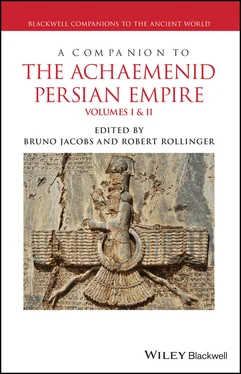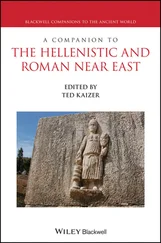Josette Elayiis Honorary Researcher at the French National Council of Scientific Research. She is the author of 25 books specializing in Phoenician studies, three books specializing in Assyrian studies, two essays related to the future of ancient history, and six novels. She created and edits the journal Transeuphratène and the collection of Supplements to Transeuphratène .
Mark B. Garrisonholds the Alice Pratt Brown Distinguished Professorship in Art History in the Department of Art and Art History at Trinity University in San Antonio, Texas. His primary research interests are the glyptic arts of ancient Iran and Iraq in the first half of the first millennium BCE.
Jean‐Jacques Glassneris Director of Research Emeritus, a former member of CNRS, and taught at Ecole des Hautes Etudes en Sciences Sociales. His publications include The Invention of Cuneiform (2003) and Mesopotamian Chronicles (WAW 19, Society of Biblical Literature, 2004).
David Grafhas taught at the University of Miami since 1986 as a specialist in the history and archeology of the Greco‐Roman Near East, with a specialty in Arabia. He has participated in the Achaemenid History Workshops, and published essays on Greek–Persian relations and Persian administration.
Birgit Gufleris a PhD Student at the University of Innsbruck. Her main research interests are Greek historiography and ethnography as well as the contacts between Greece and the Ancient Near East.
Holger Gzella, born in 1974 in Germany, is Full Professor of Old Testament at Munich University. His main interests are the historical‐comparative grammar of the Semitic languages and the cultural history of Syria–Palestine in Antiquity. He is a member of, among others, the Royal Netherlands Academy of Arts and Sciences.
Ivo Hajnalis Professor for Linguistics at the University of Innsbruck. His research focuses on comparative and historical linguistics, Mycenaean Greek, and the languages of Asia Minor in the second to first millennium BCE.
Arnulf Hausleiteris a Researcher in the Orient Department of the German Archaeological Institute (DAI, Germany) and has been teaching at Freie Universität Berlin since 1997. He has been excavating at the oasis of Taymā’ since 2004 and published on the archeology of northwest Arabia and northern Mesopotamia in the Bronze and Iron Ages
Sandra Heinschis Associate Professor of Near Eastern Archaeology at the University of Innsbruck. She specializes in the archeology of the first millennium BCE in Mesopotamia and South Caucasus. She is currently conducting excavations in South Caucasus and Iran. Among her recent works is the presentation of the Austrian excavations in Borsippa, Iraq.
André Helleris Lecturer in Ancient History at the Julius‐Maximilians‐Universität Würzburg. His main research interests are the Ancient Near East in the first millennium BCE, the Hellenistic states, Roman policy in the East, and the northwestern provinces of the Roman Empire.
Wouter F.M. Henkelmanis Associate Professor of Elamite and Achaemenid Studies at the École Pratique des Hautes Études (Paris). Among other interests, he specializes in Achaemenid Elamite sources from the Persian Empire and is involved in editing the Elamite Fortification texts from Persepolis as well as the Elamite version of the Bisotun inscriptions of Darius I.
Matthias Hoernesis postdoc assistant in Greek archaeology at the University of Vienna, Austria. He is interested in the history of Iran, the funerary archeology of pre‐Roman Italy, and transcultural encounters and dynamics in the Iron Age ‐Archaic Mediterranean, especially in Sicily and southern Italy.
Bruno Jacobsis Professor for Ancient Near Eastern Studies at the University of Basel. His main interests are the archeology and history of the first millennium BCE, especially the Achaemenid Empire, interrelations of the Ancient Near East with the Mediterranean, the Parthian Empire, and Commagene.
Michael Jursais Professor of Assyriology at the University of Vienna. Recent publications include Aspects of the Economic History of Babylonia in the First Millennium BC (2010) and, with Eckart Frahm, Neo‐Babylonian Letters and Contracts from the Eanna Archive (2011).
Oskar Kaelinis Near Eastern Archaeologist at the University of Basel, Switzerland. He is a researcher in a project editing historical sources on the Phoenicians, associate editor in the project “Iconography of Deities and Demons in the Ancient Near East” (Zurich/Fribourg), and co‐director of the excavation in Tall al‐Hamidiya, Syria.
Deniz Kaptan, Adjunct Professor at the Department of Anthropology, University of Nevada Reno, is the author of The Daskyleion Bullae: Seal Images from the Western Achaemenid Empire (2002). She is preparing a publication about seals and seal use in Anatolia during the Achaemenid Empire period.
Florian S. Knaussreceived his PhD in Classical Archaeology at the Universität des Saarlandes in 1993. In 1994–2001 he was Assistant Professor in Münster, and from 2001 to 2011 Curator at the Staatliche Antikensammlungen und Glyptothek München. Since 2011 he has been Director of these museums. He has been concerned with Achaemenid remains in the Caucasus region since 1994, for example excavations in Georgia (1994–2000) and Azerbaijan (2006–2019).
Reinhard G. Kratz, born in 1957, has been Professor for Hebrew Bible at Georg‐August‐University since 1995 and a member of the Academy of Sciences and Humanities Göttingen since 1999. His main fields of research are the history of the biblical literature, Ancient Near Eastern and biblical prophecy, and Judaism in Persian and Hellenistic‐Roman times (including the Dead Sea Scrolls).
Amélie Kuhrtis Professor Emeritus of Ancient Near Eastern History at University College London and a Fellow of the British Academy. She is author of The Ancient Near East (2 vols., 1995) and The Persian Empire – A Corpus of Sources from the Achaemenid Empire (2 vols., 2007). Her research areas are Mesopotamia in the first millennium BCE and the Achaemenid and Seleucid empires. She co‐organized and co‐edited with Heleen Sancisci‐Weerdenburg five of the Achaemenid History Workshops.
Walter Kuntneris Senior Researcher at the University of Innsbruck. He has conducted numerous excavations in the Near East and specializes in the archeology of the first millennium BCE. He is currently conducting excavations in Aramus, Armenia, Khovle Gora, Georgia, and Chors, Iran.
Angelika Lohwasseris Full Professor for Egyptology at the University of Münster, Germany. She is an expert in the archeology and history of Nubia. Other research interests are material culture, iconography in ancient Nubia and Egypt, funerary archeology, and conceptions of the body.
Andreas Mehl, born in 1945, was between 1985 and 2011 a Professor for Ancient History at the universities of Koblenz‐Landau, Darmstadt, Erlangen‐Nürnberg, and Halle‐Wittenberg. His fields of research are Cyprus in antiquity, Hellenism (Seleucid Empire), ancient (Roman) historiography, and history of culture.
Mischa Meieris Professor of Ancient History at the University of Tübingen. His main focus is Greek history in the archaic and classical eras, as well as Roman history in the early and late Imperial period and in late antiquity.
Wolfgang Messerschmidtis Free Scholar at Cologne University, Germany. His special research areas are the archeology and history of the Ancient Middle East in Hellenistic times, Babylon from the Neo‐Babylonian to the Hellenistic period, and Achaemenid Iran.
Читать дальше












